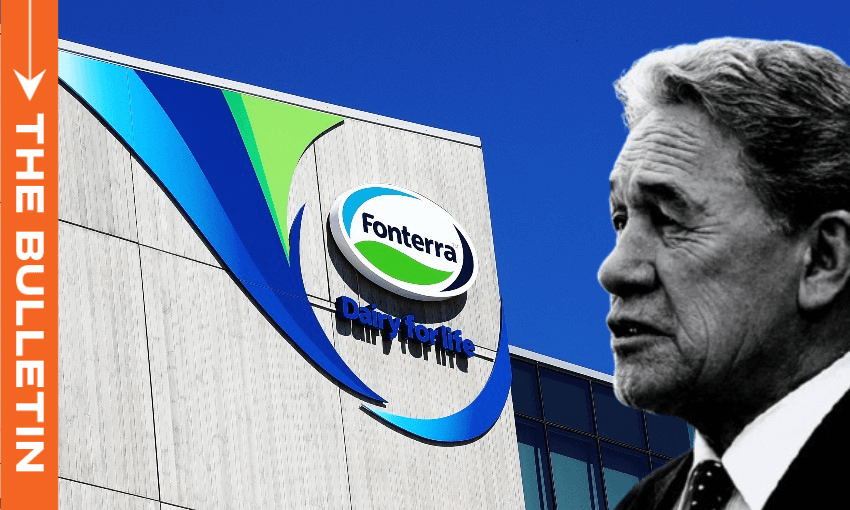With 10 days left until the final vote, the NZ First leader hopes to persuade Fonterra’s owners to keep hold of our most famous dairy brands, writes Catherine McGregor in today’s extract from The Bulletin.
To receive The Bulletin in full each weekday, sign up here.
Peters’ warning to farmers
Winston Peters has called on farmers to reject Fonterra’s $4.2 billion sale of its consumer brands to French dairy giant Lactalis. In an open letter on Friday, the NZ First leader told farmers the decision would shape the country’s future, cautioning them to think beyond the “short-term sugar hit” of a cash windfall. He warned that if the deal went ahead, “perhaps we need to revisit the regulatory environment” governing the amount of milk Fonterra must sell to other producers – a statement he later insisted was not a threat, but simply “Parliament’s duty”.
RNZ’s Russell Palmer reports that his remarks sparked a sharp exchange with Act leader and regulation minister David Seymour, who argued politicians should “leave it to those milking cows”. Peters retorted that he had milked cows for nearly two decades and that Fonterra was claiming its “monopoly privilege” was its own right to sell. “No, it’s not. It’s the right of the New Zealand people.”
Fonterra’s big structural shift
As Emma Gleason explains in a useful explainer for The Spinoff, the deal Peters opposes is one of the most significant restructures in Fonterra’s 23-year history. The co-operative has agreed to sell its global consumer brands business – including Anchor, Mainland, Kāpiti, Fresh’n Fruity and Primo – to Lactalis for between $3.8 billion and $4.2 billion. The sale includes three New Zealand manufacturing sites and an agreement guaranteeing that NZ milk will still go into the brands’ products for at least the next decade. The move will allow the co-op to focus on its higher-margin ingredients and foodservice divisions, particularly in the booming Chinese market. Dairy farmers are now voting on the proposal and are widely expected to approve it, giving them a $2-per-share tax-free capital return.
NZ First’s stand against foreign control
Behind Peters’ campaign lies a core belief. As Dan Brunskill writes in Interest.co.nz, “NZ First hates being in thrall to corporate interests and foreign ones in particular. It is by far the widest ideological gap between NZ First and the rest of the coalition.” Peters argues that selling the brands built by generations of New Zealand farmers will leave the country’s biggest exporter at the mercy of global buyers, with fewer tools to shape its own economic destiny. It’s not the first time he’s come out swinging against Fonterra: his party made similar objections when the dairy giant sold Tip Top to British-owned Froneri in 2019.
Where once Peters’ approach seemed hopelessly old-fashioned, protectionism is increasingly back in vogue for many countries amid Trump’s tariff shocks and resulting supply-chain anxieties. In this new world order, Brunskill says, “economic security has dethroned economic efficiency” as the most important priority.
‘A tactical win, but a strategic loss’
Peters has found an unlikely ally in Simplicity founder Sam Stubbs, who recently described himself as a “capitalist socialist” (“by that I mean capitalism is the best way to make money, with socialism one of the best ways to spend it”). Like Peters, Stubbs believes the sale might be good for today’s balance sheet but is poor strategy for the long term. In The Post (paywalled), he argues that for Fonterra, “this sale demonstrates either an absence of long-term vision, or an inability to execute it globally.”
Stubbs sees the deal as part of a wider failure of corporate governance in New Zealand, where big firms too often take the “path of least added-value” and sell our economy’s “crown jewels” to foreign owners. Fonterra’s plan, Stubbs writes, may be a “tactical win, but a strategic loss” in which the local dairy giant ends up feeding the growth of a foreign company. Whether farmers share that view will be clear on October 30, when the co-op’s owners cast their final votes on the sale.
Related:
Subscribe to +Subscribe

